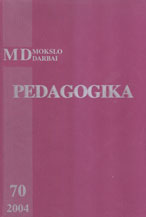Gimtosios kalbos ugdymo didaktika: integruoto mokymo galimybės
Didactic Tools for Mother Tongue Training: an Integrated Training Potential
Author(s): Vilija SalienėSubject(s): Education
Published by: Vytauto Didžiojo Universitetas
Summary/Abstract: Education scientists emphasise that didactic objectives of university and study programmes should be oriented not only to provision of fundamental and application knowledge, but also to teaching of activity and problem solving (including non-structural problems) methods. Professional competence of a teacher is based on his or her subject-specific and didactic competence. The most common categories of competence considered to be of great importance to the teacher as discussed in the educational literature could be summarised into four main blocks: subject-specific competence, subject-specific didactic competence, pedagogical and psychological competence, and understanding of outlook, culture and social phenomena. No doubt, pedagogical subject-specific knowledge is of great importance in the process of training teachers, since this knowledge is an object of didactic tools. Nevertheless, understanding of outlook, culture and social phenomena is of no lesser importance. The scope of both subject-specific didactics at higher school level and mother tongue at the secondary school level are expanded by necessity. This determines the origin of new training methods, didactic provisions and training principles. The didactic content of a subject depends not only upon the academic contents of the subject concerned (e.g., the Lithuanian language), but also upon didactic, value-related beliefs, identification and implementation of training or learning priorities. Integration is one of the most important provisions in relation to the Lithuanian language as a school subject. This is why the didactics of developing language skills, being among the critical disciplines in teacher training programmes, should convey the integrated language training model to students. This article attempts to analyse the concept of integration, as it is understood in literary sources, as well as to define the concept of integration in relation to Lithuanian language training and to present possible models of integrating the Lithuanian language and literature. The article makes a hypothesis that integration of related school subjects contributes to development of wider skills, to formation of the comprehensive view of the world, and prevents overloading with too many subjects.
Journal: Pedagogika
- Issue Year: 2004
- Issue No: 70
- Page Range: 181-186
- Page Count: 6
- Language: Lithuanian

